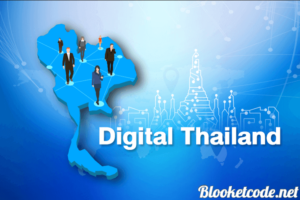Introduction
Thailand is emerging as a key player in the global digital technology landscape. With a rapidly growing tech ecosystem, the country is embracing cutting-edge innovations that are transforming various industries.
From artificial intelligence (AI) and 5G networks to blockchain and digital healthcare, Thailand is poised to lead the way in Southeast Asia’s digital revolution.
In this article, we’ll take a closer look at the latest digital technologies shaping Thailand and how they are impacting the nation’s economy and society.
Thailand’s Digital Transformation: A Roadmap for Growth

Thailand’s shift toward digital technology is largely driven by the Thailand 4.0 initiative, which focuses on transforming the economy through technological innovation.
The aim is to modernize sectors like agriculture, manufacturing, and services by incorporating digital tools and practices.
This national strategy sets the stage for Thailand’s transition into a high-income nation by promoting sustainable, knowledge-based growth.
The Digital Economy and Society Development Plan also plays a pivotal role in steering the country’s digital transformation.
This plan outlines the goals of improving digital infrastructure, enhancing digital literacy, and ensuring a seamless integration of technology across industries.
Artificial Intelligence (AI) and Robotics
One of the most exciting areas of growth is AI and robotics. AI is revolutionizing industries by automating tasks, improving decision-making, and enhancing customer experiences.
In Thailand, AI is being adopted in areas such as retail, healthcare, and agriculture.
For instance, the use of AI-powered chatbots has become widespread among e-commerce businesses, enabling them to offer round-the-clock customer support.
In the agricultural sector, AI-driven solutions are being used for precision farming, allowing farmers to optimize crop yields and reduce waste.
Moreover, robotics is finding its way into Thailand’s manufacturing and hospitality industries.
The use of robots for tasks such as food preparation, service, and factory assembly is on the rise, particularly in response to the labor shortages in these sectors.
The Potential of 5G: Enabling a Connected Future
Thailand is one of the first countries in Southeast Asia to roll out 5G networks, a transformative technology that will enable faster connectivity and unlock new possibilities for businesses.
The introduction of 5G is expected to fuel the growth of the Internet of Things (IoT), smart cities, and autonomous vehicles.
With its low latency and high bandwidth, 5G is also set to improve Thailand’s logistics and transportation sectors.
For instance, it will enhance the capabilities of autonomous vehicles, making them more reliable and safe, and boost the efficiency of supply chains by allowing real-time tracking of shipments.
E-Commerce Boom
E-commerce has exploded in Thailand, particularly due to the rise of mobile internet usage and the convenience of online shopping platforms.
Companies such as Lazada, Shopee, and JD Central are leading the charge in this space, offering everything from electronics to groceries at the click of a button.
Thailand’s e-commerce sector saw significant growth during the COVID-19 pandemic, with more consumers turning to online shopping.
This shift has pushed traditional retailers to adapt by launching their online platforms or collaborating with e-commerce giants.
In addition, social commerce – selling products through social media platforms like Facebook and Instagram – has become a prominent trend in Thailand’s digital retail landscape.
Blockchain and Cryptocurrency
Thailand is also witnessing a rise in blockchain technology and cryptocurrency adoption.
Blockchain provides a decentralized way to verify transactions, making it ideal for industries that require transparency and security, such as finance, healthcare, and supply chain management.
The Bank of Thailand is exploring the development of a central bank digital currency (CBDC), which could revolutionize the country’s financial sector.
Cryptocurrency exchanges, such as Bitkub and Satang Pro, are also gaining traction, providing Thai citizens with access to global digital assets.
Moreover, blockchain is being used in the traceability of goods, helping businesses ensure transparency in their supply chains, especially in industries like agriculture and manufacturing.
Digital Healthcare: A New Frontier for Thai Medicine
The healthcare sector in Thailand is undergoing a major digital transformation. With the rise of telemedicine and wearable health devices, patients can now access medical consultations and health monitoring from the comfort of their homes.
AI diagnostics are also being employed in hospitals to assist doctors in making more accurate diagnoses, particularly in the fields of radiology and oncology.
Additionally, the use of health apps has enabled Thai citizens to manage their wellness more effectively, from tracking their diet and exercise to monitoring chronic conditions like diabetes.
Thailand is also positioning itself as a medical tourism hub, and digital healthcare technologies are enhancing the country’s ability to attract international patients seeking high-quality medical treatment at lower costs.
The Role of Startups in Thailand’s Digital Future
Thailand’s startup ecosystem is thriving, especially in cities like Bangkok and Chiang Mai, which are home to a vibrant community of tech entrepreneurs.
Startups in areas such as fintech, health tech, and agri-tech are driving innovation and contributing to the country’s digital economy.
Thailand’s government has created various programs, such as Startup Thailand and the Digital Economy Promotion Agency (DEPA), to support and nurture these tech startups.
These initiatives provide funding, mentorship, and business development resources to help entrepreneurs turn their ideas into successful businesses.
Thailand’s Digital Workforce
As digital technologies become more prevalent, there is a growing demand for a digitally skilled workforce in Thailand.
The government is actively promoting digital literacy and encouraging citizens to acquire new skills in areas like data science, AI, and cybersecurity.
Several educational institutions and private companies are offering upskilling programs to equip workers with the necessary digital skills.
Initiatives such as coding boot camps, online courses, and vocational training programs are helping to bridge the skills gap and ensure that Thailand’s workforce remains competitive in the global digital economy.
Conclusion
The rapid adoption of new digital technologies in Thailand is setting the stage for a future where innovation drives economic growth and improves the quality of life.
With government support, a thriving startup ecosystem, and advancements in AI, 5G, blockchain, and healthcare, Thailand is positioning itself as a leader in Southeast Asia’s digital revolution.
As the country continues to invest in its digital infrastructure and workforce, the potential for technological breakthroughs in Thailand is limitless.





